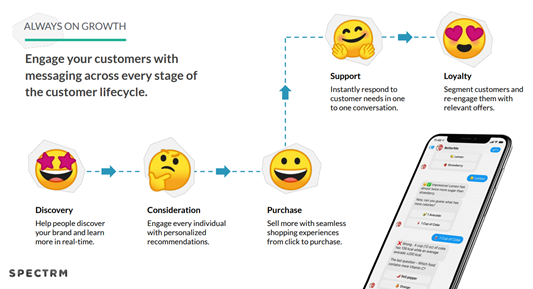In the dynamic realm of modern marketing, the integration of Artificial Intelligence (AI) has emerged as a crucial asset for businesses seeking to secure a competitive edge. This series of blogs delves into the dynamic intersection of AI and marketing strategies, uncovering how intelligent algorithms and machine learning are reshaping the landscape. From crafting personalized customer experiences to facilitating data-driven decision-making, join us as we explore the transformative power of AI in marketing. These articles provide insights and practical applications, catering to both seasoned marketers and those embarking on their digital journey. By demystifying the role of AI, we aim to shed light on its profound impact on the future of marketing.
Conversational marketing platforms that utilize automated, personalized, real-time conversations are reshaping digital commerce
Conversational marketing technology is utilizing developments in machine learning algorithms and artificial intelligence (AI) to facilitate machine-powered selling to consumers via the use of chatbots.
These marketing automation solutions enable businesses to personally engage their audiences in both scripted and unscripted conversations, in real-time and at scale.
Chatbots are computer programs that simulate human conversation through voice or text commands – or both.
To understand how far we’ve come from the earliest version of chatbot technology, it’s helpful to know where it all started.
The first chatbot, Eliza, was developed at MIT in the 1960s by Joseph Weizenbaum. It works using a decision-tree model, and by recognizing keywords and phrases then responding based on a pre-programmed script.
The next innovation in chatbots came in 1995 with the development of the Artificial Linguistic Internet Computer Entity (A.L.I.C.E.), which was created by Dr Richard Wallace to simulate chatting over the internet.
Like Eliza, Alice uses pre-configured templates to respond to human input, but she also has some limited learning capabilities. Alice also takes a decision-tree approach, although her learning capabilities get her closer to the modern version of chatbots.
By 2006, IBM gave us Watson, a chatbot that uses natural language processing (NLP) and machine learning.
Siri, a virtual assistant integrated with Apple’s iOS, was launched in 2010. Siri put chatbots and voice technology on the map in a major way.
Following Siri, Google launched Google Now in 2012. Then came Amazon’s Alexa and Microsoft’s Cortana in 2015. These are widely used intelligent virtual assistants that recognize natural language commands through voice and text.
The popularity of messaging chatbots coincided with the launch of Facebook Messenger in 2016. Through Facebook’s API, developers could create bots that interacted with Facebook users.
The emergence of conversational marketing platforms is the next iteration of chatbot technology.
Platforms like Spectrm, a Berlin-based conversational technology company, take chatbots to a new level of functionality designed to improve and enhance customer experience.
Marketing chatbots enable businesses to streamline engagement with customers, clients, and prospects by using automated, personalized, real-time conversations across a variety of messaging channels to drive action.
The potential is limitless. More than two billion people can be engaged on Facebook and Instagram using Facebook Messenger and, according to Spectrm, three-quarters of consumers prefer to engage with brands in private messaging versus traditional channels. 90 percent of internet users can be reached with Spectrm and Google AdLingo using conversational display ads.
A marketing chatbot can drive marketing performance and return on investment (ROI), facilitate personalized brand experiences at scale, and gather insights from customers that are used to recommend products, ensuring businesses can reach their customers across multiple channels.
Intelligent chatbot technology like Spectrm’s is designed to personalize the customer journey using real-time conversation. Marketers combine scripted conversation flows and AI-driven chat to engage customers from websites and apps, paid social ads, and their favorite messenger apps.
Conversational marketing platforms use powerful AI technology, analytics, and a range of features to design exceptional and personalized customer experiences. They make intelligent chatbot technology accessible to companies regardless of their in-house technical capabilities.
Platforms like Spectrm differ from simple, rules-based chatbots in a few ways:
The goal with any conversational marketing platform is to simplify the process of building customer relationships by using chatbots throughout the customer journey. 
“We operate on multiple messaging channels where consumers spend all of their time: Facebook Messenger, Instagram Messaging, Google Business Messages, and Conversational Display Ads (AdLingo and Google DV360),” according to Spectrm.
“This enables the business to connect instantly via chat with target audiences on Facebook, Instagram, and other platforms.”
Before the pandemic, messaging was the preferred way for customers to connect with businesses while they shopped online. 40 percent of people surveyed in a 2019 global Facebook study said they started their online shopping journey with chat.
64 percent of people, regardless of age, indicated they preferred messaging to a call or email, and 65 percent said they’d be more likely to shop with a business that they can contact via chat. These long-term shifts towards online shopping and messaging have accelerated since the pandemic.
One of the things that set conversational marketing platforms apart from rules-based chatbots is how it uses personalized chat to generate ecommerce sales, enabling conversations at every point in the customer lifecycle.
By using data consumers willingly share in chat, marketers can reduce their dependence on third-party data and tracking technologies while still giving their prospects a personalized digital experience.
Conversational commerce technology is designed to engage customers in direct, one-to-one conversations across a variety of channels.
Platforms like Spectrm are 100 percent code-free, making it possible for any business to easily implement conversational AI as part of their marketing strategy.
More about:
Lucy helps organizations leverage knowledge for in… View Tech Talk
TVSquared is the global leader in cross-platform T… View Tech Talk
Grata is a B2B search engine for discovering small… View Tech Talk
Streaming has become a staple of US media-viewing … Download Now
Data is the lifeblood of so many companies today. … Download Now
This report documents the findings of a Fireside c… Download Now
The Merkle B2B 2023 Superpowers Index outlines wha… Download Now
Streaming has become a staple of US media-viewing habits. Streaming video, however, still comes with a variety of pesky frustrations that viewers are …
Data is the lifeblood of so many companies today. You need more of it, all of which at higher quality, and all the meanwhile being compliant with data…
This report documents the findings of a Fireside chat held by ClickZ in the first quarter of 2022. It provides expert insight on how companies can ret…
The Merkle B2B 2023 Superpowers Index outlines what drives competitive advantage within the business culture and subcultures that are critical to succ…
The rise of Large Language Models (LLMs), such as ChatGPT brings opportunities for creative marketing executives to transform not just their brands bu…
Exclusive advice from global influencer and CXO leader, Cyril Coste on how to amp up your customer experience (CX) strategy and connect AI with digita…
How a non-cookie-cutter strategy optimized CX and won the brand a historic average session length Read More…
Google’s decision to kill Chrome’s third-party cookies shifted to 2023 but that should not lull digital advertisers and publishers into complacency – …
Wall Street Journal Best Seller, Helen Yu shares reflections about the inner workings of AI, the causes for distrust, and the potential route organiza…
Oracle CX Sales Strategist, Kayleigh Halko highlights how today’s CRM isn’t cutting it for sellers and why AI needs to be injected to help give intell…
By 2025, it’s likely that nine dollars of every $10 will be spent on the digital experience versus phone/voice. Oracle Service’s SVP and GM, Chris McG…
Channable is a global retail platform that enables digital marketers, brands, and online retailers to effectively automate and manage their online ret…
Enter the 6-digit verification code sent to
Copyright © 2024 ClickZ
